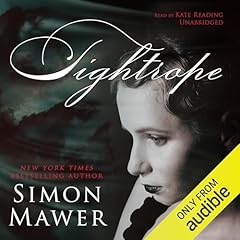
The Death of the Adversary
A Novel
No se pudo agregar al carrito
Solo puedes tener X títulos en el carrito para realizar el pago.
Add to Cart failed.
Por favor prueba de nuevo más tarde
Error al Agregar a Lista de Deseos.
Por favor prueba de nuevo más tarde
Error al eliminar de la lista de deseos.
Por favor prueba de nuevo más tarde
Error al añadir a tu biblioteca
Por favor intenta de nuevo
Error al seguir el podcast
Intenta nuevamente
Error al dejar de seguir el podcast
Intenta nuevamente
Prueba gratis de 30 días de Audible Standard
Selecciona 1 audiolibro al mes de nuestra colección completa de más de 1 millón de títulos.
Es tuyo mientras seas miembro.
Obtén acceso ilimitado a los podcasts con mayor demanda.
Plan Standard se renueva automáticamente por $8.99 al mes después de 30 días. Cancela en cualquier momento.
Compra ahora por $17.24
-
Narrado por:
-
James Clamp
Written while Hans Keilson was in hiding during World War II, The Death of the Adversary is the self-portrait of a young man helplessly fascinated by an unnamed "adversary" whom he watches rise to power in 1930s Germany. It is a tale of horror, not only in its evocation of Hitler's gathering menace but also in its hero's desperate attempt to discover logic where none exists. A psychological fable as wry and haunting as Badenheim 1939, The Death of the Adversary is a lost classic of modern fiction.
Los oyentes también disfrutaron:




















Reseñas de la Crítica
<p>“For busy, harried or distractible readers who have the time and energy only to skim the opening paragraph of a review, I'll say this as quickly and clearly as possible: <i>The Death of the Adver</i>sary and <i>Comedy in a Minor Key</i> are masterpieces, and Hans Keilson is a genius . . . Although the novels are quite different, both are set in Nazi-occupied Europe and display their author's eye for perfectly illustrative yet wholly unexpected incident and detail, as well as his talent for storytelling and his extraordinarily subtle and penetrating understanding of human nature. But perhaps the most distinctive aspect they share is the formal daring of the relationship between subject matter and tone. Rarely has a finer, more closely focused lens been used to study such a broad and brutal panorama, mimetically conveying a failure to come to grips with reality by refusing to call that reality by its proper name . . . Rarely have such harrowing narratives been related with such wry, off-kilter humor, and in so quiet a whisper. Read these books and join me in adding him to the list, which each of us must compose on our own, of the world's very greatest writers.” —<i>Francine Prose, The New York Times Book Review</i><br><br>“A welcome reissue of a classic . . . This psychologically subtle and acute account of denial in the face of Hitler's rise to power received strong acclaim before disappearing from print. With the celebration last year of the 100th birthday of Keilson . . . the novel has lost none of its insidious power . . . The narrative recalls the existential depth of Camus and the fabulist absurdity of Kafka or Beckett.” —<i>Kirkus Reviews (starred review)</i><br><br>“The power of the unsaid haunts this devastating novel . . . A profoundly affecting exploration of the inextricable nature of love and hate, friend and enemy, Keilson's work . . . is as stimulating today as it was half a century ago.” —<i>Publishers Weekly</i><br><br>“Since Adolf Hitler, an outpouring of writing has tried to explain the violence that human beings do to one another . . . Perhaps the profoundest explanation to date comes from the pen of a Jewish writer driven from Germany in 1936 and now living in Holland. Hans Keilson's novel subtly and eloquently probes the ambivalent relation of victim with aggressor . . . Keilson traces the growth of hatred in his leading character as other writers trace love or self-knowledge.” —<i>Time, Best Books of 1962</i></p>
Not for Me
Se ha producido un error. Vuelve a intentarlo dentro de unos minutos.
The main character of Keilson’s novel refuses to believe his father, or acquaintances at work and school, of the threat of an unnamed adversary in his home country. This anti-hero pursues his life as though the threat of State terror would pass without affecting his life. However, as events unfold, the anti-hero hears the radio voice of “…the Adversary” and begins to understand the underlying murderous intent of a charismatic political actor who will turn the country’s lives upside down. Keilson writes of a speech given by “…the Adversary” to give the reader/listener some insight to the power of words in the hands of a consummate actor. “The power of words” is a terrifying realization to the anti-hero. The realized terror is that spoken words by one actor can lead to a genocidal mania on the part of a chosen people.
The final chapters offer the anti-hero the opportunity to kill “…the Adversary”. He chooses not to and history shows his decision to be both right and wrong. It is right in light of the ultimate death of “…the Adversary” because of actions of others to stop his reign of terror. It seems wrong because of the death of many (particularly the anti-hero’s parents), and his failure to confront “…the Adversary” before it was too late. Keilson makes a fine and ironic point by having the anti-hero murdered before escaping the country.
One is compelled to wonder about oneself in listening to Keilson’s story. Who will choose to confront the adversary? Who will “go along to get along”?
A CHILLING VIEW
Se ha producido un error. Vuelve a intentarlo dentro de unos minutos.


